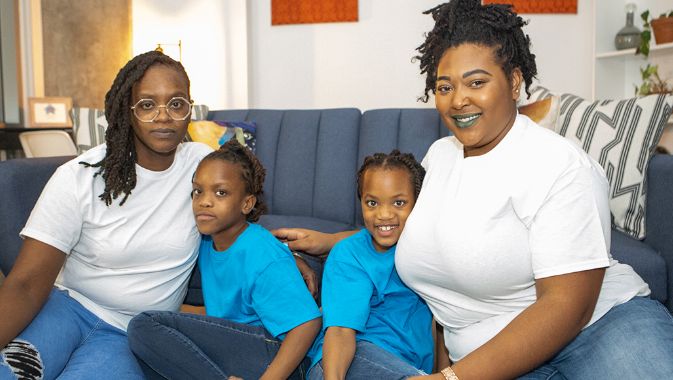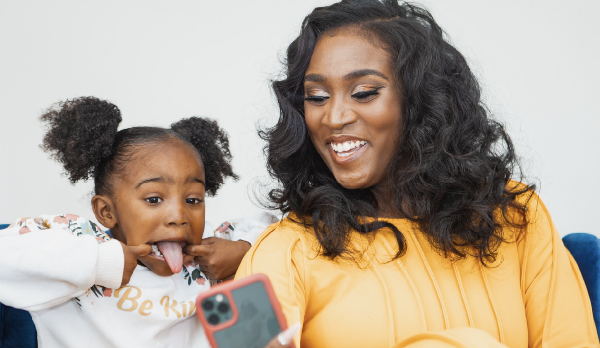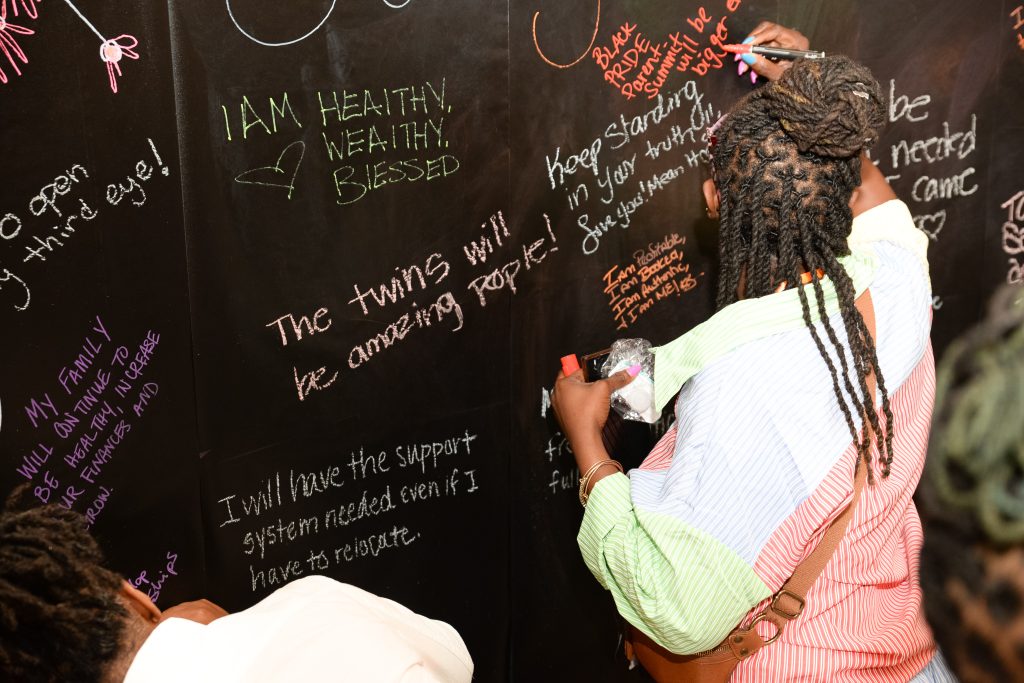How One Mother Developed the Largest Community for Black, Queer Parents

Believe it or not, Mia Cooley doesn’t label her trailblazing work as anything that special.
In just a few years, she conceptualized what’s become the largest community for Black, queer parents.
xHood, a space designed for LGBTQ+ people to build happy families, started as a Facebook group in 2019.
As Cooley sought to grow her own family, she struggled to find somewhere safe and inclusive to discuss it.
“I was in a bunch of other groups, but I spent more time defending the fact that we were two moms, or defending queer children,” said Cooley, mom to 5-year-old Nova who will be a big sister this summer. She was raising two older children before starting xHood and realized they, too, could use support coming from a two-mom household. “It just made me feel like this is not the kind of space I can share any of our struggles at all.”
Unique challenges sit at the intersection of Black and queer parenting, and Cooley did not want to address all of them. We
We don’t just show up as a Black person, we don’t just show up as a mother or father or parent, and we don’t just show up queer or gay. We are all those things at once.
Mia Cooley, xHood Founder
xHood creates deep connections and support systems. While Cooley is humbly living her calling to nurture Black queer families into and through parenthood, her epic efforts have made a difference for couples who have too long been excluded.
Families Aren’t Just Black and White
Cooley believes when it comes to family, Black, queer people are often an afterthought. Though building xHood started for her to find information and support in family planning, it became a platform for her to shift the conversation entirely.
Honestly, when we think of well-supported families, nobody’s thinking about Black queer parents.
Mia Cooley, xHood Founder
First, it starts with collectively widening perspectives on family structure.
“Black people have and queer people have such a longstanding history of building such intentional families,” Cooley said. “No one has the history the way that Black people do of having aunties and cousins that you are not related to but you probably lived with half of your life. The queer community, from ballroom culture and beyond, they have mothers and fathers that are playing integral roles in the raising of our queer youth, and no one is seeing that as a valid form of family.”

Black same-sex couples are more likely to raise children than white same-sex couples, yet Black, queer parents remain largely excluded from LGBTQ+ family building.
They have always found ways to form families, but Cooley looked to increase their visibility and education.
“Honestly, when we think of well-supported families, nobody’s thinking about Black queer parents. They’re thinking of two white guys with access to a lot of resources and three kids that don’t match them,” Cooley said. “I just really wanted to change that narrative, because we’re raising healthy and happy kids as well. We’re figuring out ways to persist in the face of discriminatory providers, in the face of misinformation. We’re persisting in the face of people who are just frankly not wanting to serve or be in our community.
“You look around at where fertility clinics are. Honey, they’re not in Black communities.”
Unique Challenges for Black and Queer Parents
Cooley learned that many are discovering barriers Black birthing people face when it’s time to start a family.
Black women are more likely to need fertility treatment but seek it at lower rates compare to white women.
When it comes to LGBQT+ couples, their starting point is many people’s last resort.
Less than 4% of the available sperm at the top U.S. facilities is from Black donors
CBS News, 2023
“When we think about the intersection of a queer person, this is where I have to start, but also as a Black person, I am more prone to endometriosis and PCOS,” said Cooley, whose finance is currently expecting. “So I need to have a little more information and more of a head start on my fertility journey.”
While Black birthing people remain largely impacted by infertility, fertility providers have a responsibility, too.
xHood is proud to partner with clinics to help LGBTQ+ people access knowledge about family planning. But there are, let’s say, green flags Cooley looks for while navigating providers and cryo-banks, where Black donors contribute less than 4% of available sperm in the top U.S. facilities.
“When we look at who is the face of fertility, it’s suburban white couples who are struggling,” Cooley said. “Their experiences are valid as well, but for us, the difference is typically this is our first stop for having kids.”
Before introducing her greater xHood community to a provider, Cooley scopes the website, social media and overall art direction. She’s looking for the authentic representation of Black and queer families.
Cooley doesn’t just look at a few web pages, either. She asks around within her robust group of thousands, mining for real-life experiences.
She wants LGBTQ+ families to feel safe, respected and seen. This was the passion that inspired xHood.
“I wanted a space where we could start to figure out those problems for ourselves,” Cooley said. “As Black women and as Black queer people, if we don’t see it, we build it for ourselves, and that’s exactly what happened with xHood.”
Building Community for Black LGBTQ+ Parents
xHood started as a social media community that quickly grew because of its value. Once Cooley expanded the group from Facebook to Instagram, she got a closer look at what families were asking for and what they wanted to experience.

From there, xHood formed community support groups for Black LGBTQ+ parents who want to come out to their children or families, those trying to find a path to babies and any other vulnerable interactions that arise within the expansive gender-expression and identity spectrum.
“That’s how events became a cornerstone in how we build and show up for our community,” Cooley said.
From May 26-28 in Washington D.C., xHood will host its second Black Parent Pride Summit. The three-day conference coincides with D.C.’s Black Pride weekend and will feature more interactive workshops, education and poignant panel discussions to follow up from its inaugural year in Atlanta.
This year’s summit is expected to attract more than 150 families.
Cooley has packaged information about shame and stigma, mindful parenting, LGBTQ+ fertility and more into a single package for queer folx looking to build their families.
What she’s accomplished through xHood is a tremendous start to bridging the gap.
“I think that there are people that are used to babies being a matter of happenstance, because it just kind of typically happens to heterosexual or straight couples,” Cooley said. “That’s the path to babies people see as normal. Not to say that there are not people in the queer community where babies are a matter of happenstance, but for a large portion of us, our kids, our families are very intentional.”
MORE LIKE THIS
Mothers share their path to parenthood and LGBTQ+ family planning support
Meet the two moms encouraging others to stop living in a box
